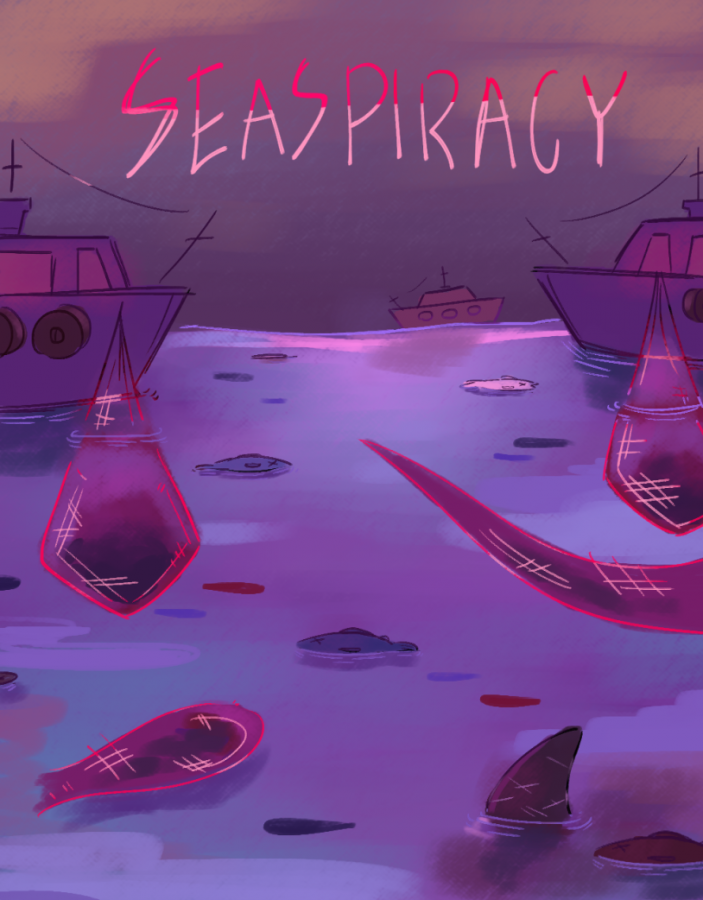On Demand: Seaspiracy Takeaways
Art/Photo by Lauryn Shin
Netflix Documentary “Seaspiracy” tackles the controversial fish market and the impact it has on the world’s oceans. The fishing industry is accused of wiping out fish in the sea, destroying habitats, and illegally hunting for whales. The filmmakers have expressed a desire to save the oceans from the fishing industry, but they have also come under fire for presenting a sensationalized version of the truth.
April 30, 2021
Quarantine may be coming to an end, but our hunger for binge-worthy content isn’t. One of the effects of social distancing has been an increase in viewership of streaming services, and Netflix is no exception, releasing new movies and series to keep up with its ever-hungry consumers. One recent documentary rattled many viewers and sparked controversy. Its name? Seaspiracy.
The documentary aims to highlight the detrimental effects of major fishing industries on the world’s oceans. It shed a condemning light on industrial fishing as both damaging to marine life and built on unethical labor practices. To one viewer, Lana Gilligan (9), what stood out most were “the alternative motives behind seemingly innocent volunteer programs, and the connectivity of each component of ecological damage.”
Seaspiracy has reached an expansive audience, however, in part because of the debate it has incited in the scientific and environmental communities. Mrs. Chambers, a biology teacher at West, didn’t watch the film, but commented: “I first became aware of [this film] because of an article on BBC News…I wondered what evidence this film was based upon and whether that evidence was used correctly.” The documentary’s use of statistics and accusations garnered massive backlash. Ms. Rivera, the AP Environmental Science teacher at West, pointed out, “[The producers] use a lot of shocking statistics, like ‘the ocean will be empty by 2048.’ This was taken from a 2006 study. This is a very shocking thing to say… that’s less than 27 years from now! This statistic is still thrown around as it will garner a response.” In addition to the usage of statistics to get a response, the filmmakers created a website to encourage viewers to take part in the “Seaspiracy Movement,” presenting a way to save the planet by “shifting to a plant-based diet and end fishing subsidies” in hopes to get more people involved.
The film’s call to action appealed to many viewers. Gilligan felt that the purpose was to “inform the viewers of what industries have the capacity to hide, and teach us how to make changes more effective than swapping straws.” Following the documentary, Gilligan had a stronger urge to “steer away from consuming animals.” This is a very common takeaway for many viewers. However, Ms. Rivera proposed a different takeaway: “We do not need to give up seafood, but as consumers, we have the power to drive the market. If we demand more sustainably produced seafood, the market will follow. [And] if this documentary makes you want to take action, DO IT! Go to a beach clean up, volunteer for an NGO, educate others when you can.”
While Seaspiracy does urge audiences to take a closer look at how they are taking action to prevent the spread of waste in oceans, many have expressed doubts about the credibility of its claims. Mrs. Chambers explained why the film producers may have chosen to distort facts: “They may have only included data and evidence that furthered the point they were trying to make. Good science has to be objective and neutral.” Sources such as BBC News, The New York Times, and The Guardian fact-checked the studies and claims that the documentary used and found multiple of them to be false, far-fetched, or misleading.
As a science teacher, Mrs. Chambers offered a final caution to viewers: “A film like this is intended to evoke a strong emotional reaction. I think it’s important to channel strong emotions into becoming more informed (even if what you find out challenges your preconceptions), asking more questions, and thinking critically and analytically about who your sources of information are before making evidence-based choices and decisions.” Before learning new information, Mrs. Chambers stressed, it’s important to fact-check and use scientific thinking instead of jumping to conclusions.
Viewers and members of the scientific community continue to debate the merits of Seaspiracy. On one hand, the film’s wide influence allows it to shed light on an environmental and ethical issue that many feel deserves more attention. Still, concerns about the validity of the documentary’s claims have brought others to see it as more harmful than helpful.






